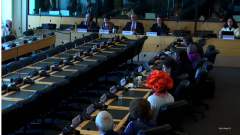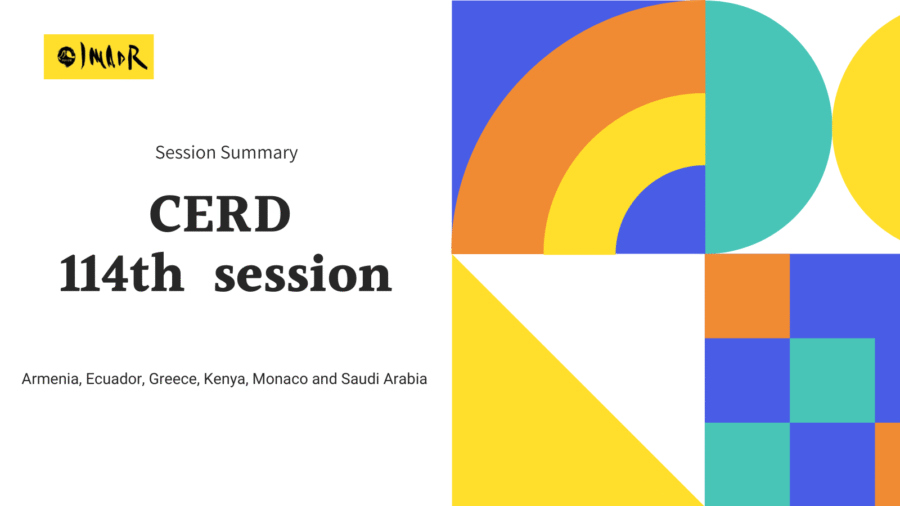Joint Communiqué: 2021 CERD election today – Need for greater geographic diversity and competition in future
June 24, 2021
Joint Communiqué
2021 CERD election today – Need for greater geographic diversity and competition in future
Geneva, Switzerland. 24 June 2021
Today, the 182 States parties to the International Convention on the Elimination of All Forms of Racial Discrimination (ICERD) were invited to vote to appoint half of the membership of the UN Committee (CERD) that is functioning as the guardian of that Convention. They elected 4 new experts and re-elected 5 members who were already sitting on the Committee, among a pool of 11 candidates.
New members include Mr. Michał Balcerzak (Poland), Ms. Régine Esseneme (Cameroon), Ms. Gay McDougall (USA) and Ms. Mazalo Tebie (Togo).
They will join 5 experts, whose terms as members of the CERD were coming to an end, and who have been re-elected for another four-year period: Mr. Nourredine Amir (Algeria), Ms. Chinsung Chung (Republic of Korea), Mr. Bakari Sidiki Diaby (Côte d’Ivoire), Mr. Gün Kut (Turkey), Mr. Yeung Kam John Yeung Sik Yuen (Mauritius), as well as the 9 other members of the Committee, whose mandate will expire in 2024[1].
Minority Rights Group International (MRG), the International Institute on Race, Equality and Human Rights (Race & Equality) and the International Movement Against All Forms of Discrimination and Racism (IMADR), congratulate the newly elected CERD members and those who were re-elected.
Following the historical milestone achieved at the last election,[2] our organisations welcome the continuation of gender parity in the Committee after today’s election. Indeed, with the election/re-election of 4 women, half of the Committee’s seats will be held by women from next year. We assert that gender diversity in the CERD membership is critical to the quality of its work, and to its legitimacy. We call on the newly composed Committee to expand and strengthen the CERD’s efforts to address intersections of racism and racial discrimination with discrimination based on gender, sexual orientation and gender identity, among other grounds for multiple and intersecting forms of discrimination.
However, in contrast, we regret that equitable geographical distribution in the CERD membership is yet to be achieved. No State from Latin America and the Caribbean region nominated candidates for this year’s election, which will make it the second least represented region from 2022. Eastern Europe continues to be least represented with only one member. On the other hand, the representation of the African region will increase from 33% to 44% from next year. We recall that Article 8 (1) of the Convention and General Assembly resolution 68/268[3] encourage States parties to ensure equitable geographical distribution in the Committee membership. The situation of racial discrimination is unique to each country and region, and balanced regional representation in the membership is crucial for the Committee as the global monitoring body.
Furthermore, our organisations are deeply concerned that this year saw the lowest number of nominations of candidates by States parties in the last 10 years[4]. A truly competitive election process is key to further the quality, the independence, and the diversity of the Committee membership. We strongly encourage States parties to contribute to a large and strong pool of candidates by nominating human rights experts of high moral standing who have recognised competence and experience in the field covered by the Convention, and are independent, in line with GA resolution 68/268 and Article 8 (1) of the Convention. Almost 100 States have received the UPR recommendation to “[a]dopt an open, merit-based selection process when selecting national candidates for UN Treaty Body elections”[5], and the majority of them supported it. In addition, the UN Secretary General recommended national competitive selection processes for the nomination of Committee experts, and/or other independent vetting processes[6]. We call on States parties to nominate candidates through such processes for future elections.
In an effort to promote a merit-based and transparent CERD election process, our three organisations circulated a questionnaire to all candidates regarding their background, relevant experience and vision of their future work as a member of the Committee. Responses received were then posted on a dedicated website: www.untbelections.org, and shared with States parties two months ahead of the election in order to help them learn the qualifications of the respective candidates and inform their decisions.
Our three organisations remain committed to contributing to efforts to strengthen the work of the CERD, the main guardian of international human rights standards against racial discrimination. Now more than ever, the CERD has a crucial role to play to participate in normative developments and to call out States for their failure to eliminate often persistent patterns of discrimination and violence affecting people belonging to racialised communities such as people of African-descent, minorities, people discriminated on the basis of caste or descent, indigenous peoples, stateless persons, migrants including refugees and asylum-seekers.
Background:
The Committee on the Elimination of Racial Discrimination is composed of 18 independent experts.
Members are elected for a term of 4 years by States parties from among their nationals, consideration being given to equitable geographical distribution and to representation of the different forms of civilization as well as of the principal legal systems, in accordance with Article 8 of the ICERD.
Elections are held every 2 years at a meeting of States parties held at the UN headquarters in New York.
The newly elected members will begin their term in January 2022 and their mandates will expire in January 2026
[1] Ms. Ali Al-Misnad (Qatar), Mr. Guisse (Senegal), Ms. Li (China), Mr. Rayess (Mauritania), Mr. Payandeh (Germany), Ms. Shepherd (Jamaica), Ms. Stavrinaki (Greece), Ms. Tlakula (South Africa), Mr. Vega Luna (Peru)
[2] https://imadr.org/joint-communique-cerd-election-2019/
[3] https://undocs.org/A/RES/68/268
[4] The number of nominees since 2011: 16 (3 withdrawn) in 2011; 17 (1 withdrawn) in 2013; 13 (1 withdrawn) in 2015; 16 (1 withdrawn) in 2017; and 16 (2 withdrawn) in 2019.
[5] Albania, Algeria, Andorra, Angola, Argentina, Armenia, Australia, Austria, Azerbaijan, Bahamas, Bahrain, Barbados, Belize, Benin, Botswana, Brazil, Bulgaria, Burkina Faso, Burundi, Cabo Verde, Central African Republic, Chad, Chile, Costa Rica, Côte d’Ivoire, Croatia, Cyprus, Czech Republic, Djibouti, Dominica, Ecuador, El Salvador, Ethiopia, Fiji, Finland, France, Georgia, Germany, Gabon, Ghana, Grenada, Guatemala, Guinea Bissau, Guyana, Honduras, India, Indonesia, Italy, Jamaica, Japan, Kuwait, Lebanon, Lesotho, Liberia, Liechtenstein, Luxembourg, Madagascar, Malawi, Maldives, Mali, Malta, Marshall Islands, Mauritania, Mauritius, Monaco, Mongolia, Montenegro, Morocco, Nauru, Nepal, New Zealand, North Macedonia, Norway, Panama, Peru, Poland, Portugal, Qatar, Republic of Korea, Republic of the Congo, Romania, Saint Kitts and Nevis, Saint Lucia, San Marino, Senegal, Serbia, Slovakia, Slovenia, South Africa, Spain, Sweden, Switzerland, Tonga, Tunisia, Tuvalu, United Arab Emirates, Vanuatu
[6] A/74/643, paragraph 71





